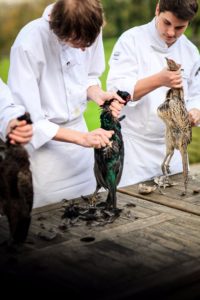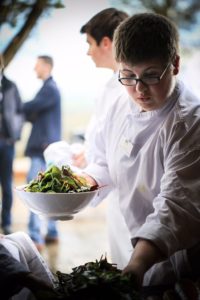Cheflife: It’s not a job, it’s a way of life!

Work hard and with passion and you’ll find catering a rewarding career. That’s what Mark Hyde-Catton, senior lecturer in the Catering department at Gloucestershire College, tells his students. But he cautions them that “it’s not a job, it’s a way of life”.
The college counts Tom Kerridge among its former students and has seen trainee chefs go on and have successful careers working for the likes of Raymond Blanc, The Roux Brothers and Heston Blumenthal.
The Chefs’ Forum asked Mark to take some time out to talk about what skills catering students need, what the challenges of the industry are and whether it’s a good thing our TV channels are saturated with cooking shows.
Tell us about the course, what it covers and how important it is to be practical and hands-on.
This year the Level 3 professional cookery course has gone through a change in the way it is delivered and assessed. It has been developed by the awarding body and leading specialists from the industry to give it more relevance to what skills employers are looking for in their staff.
 The most noticeable change is the element of employer engagement, where industry professionals in a wide range of different subject matters will forge a working relationship with the college and come in and do guest master classes, which will be linked to criteria of the units and also help with the assessment of the students skills.
The most noticeable change is the element of employer engagement, where industry professionals in a wide range of different subject matters will forge a working relationship with the college and come in and do guest master classes, which will be linked to criteria of the units and also help with the assessment of the students skills.
It will give the students a well-rounded knowledge for all areas of the business teaching them supervisory skills, various business costings much more than just food costs and selling price.
It will make them think about sustainability, seasonal ingredients, menu and dish development as well as practical skills in food preparation and cooking with modern trends such as sous vide and molecular gastronomy.
This will prepare them for the final practical exam which will be a scenario where they will have to research and write a menu incorporating costings, sustainability and the seasons. As mentioned above, then they will submit a food order for them to produce a tasting menu to be served and assessed, this is the practical element. There will also now be an online written assessment as well, so there will need to be a balance between practical knowledge and the skills required to effectively be competent at the managerial side of running a kitchen.
Can you sum up your approach to training young chefs, do you have a particular motto?
 Whenever your teaching young people one of the most important elements to remember is that you have to make it interesting and engaging for them with some fun or humour thrown in. Be honest with them, make it relevant and current with trends that are in the industry, with specific boundaries and rules, but the most important attribute is to have PASSION about everything.
Whenever your teaching young people one of the most important elements to remember is that you have to make it interesting and engaging for them with some fun or humour thrown in. Be honest with them, make it relevant and current with trends that are in the industry, with specific boundaries and rules, but the most important attribute is to have PASSION about everything.
If the students can see you have that then it starts to rub off on them. I also think it’s important to give them some ownership of the training and one way I achieve this is by asking them to come up with dish ideas for the menus which we then develop. There’s nothing better for a student than seeing one of their dishes being served in the public restaurant.
And finally, always tell them when they have done something well, to give them a sense of pride and achievement.
I don’t have a particular motto as such but I think it’s always best to lead by example and I tell the students if they catch me doing something I’ve told them they shouldn’t do to point it out, like they are trying to catch me out!
How do you go about preparing young people for the challenges of working in busy, professional kitchens?
I generally teach Level 3 students, so it’s about embedding professionalism and good work ethics.
At the beginning of the course I make it perfectly clear they are there to be role models for the Level 1 and Level 2 students to aspire to. They have to treat their time with me as if they are at work, so if they are ill they let me know.
 They arrive in whites with all necessary equipment they need ready to start work 15 minutes before the official start time. I expect 100% commitment from them – no excuses – and when there are events such as the Chefs Forums it’s not optional to attend, it is part of their course even if it means a longer day than normal (sometimes it falls in their half term!).
They arrive in whites with all necessary equipment they need ready to start work 15 minutes before the official start time. I expect 100% commitment from them – no excuses – and when there are events such as the Chefs Forums it’s not optional to attend, it is part of their course even if it means a longer day than normal (sometimes it falls in their half term!).
We go when the work is done at the Chefs Forum, no clock watching. They are representing not only the college and myself but themselves and it is such a good opportunity to work with and learn from some exceptional chefs, who they wouldn’t normally have the opportunity to work with and the students can network and showcase their talents as well which could lead to work experiences or jobs in the future.
After the first term on a rota, they take on the responsibility of head chef to run the college’s public restaurant kitchen, so they learn how to communicate with others and the importance of team work and supporting each other. If the dishes they are responsible for are not ready or something is wrong I send them out to see the customer, I won’t let them hide behind the restaurant staff.
I probably sound quite strict but I do feel the students learn respect and when a favour is needed they are always willing to help and go the extra mile. It’s good to see them grow in confidence and have pride over what they do. The best evidence is when a student turns to me and critically says to me about my work “are you happy with that chef?”
There’s a question that we have to ask ourselves as trainers and this can apply to all industries and vocations; “if a student has achieved their qualification and goes to industry but only stays a month or so, have we been successful?”
Most will say yes they pass their qualification, we can’t be responsible for them when they leave, which is true, but I would feel I hadn’t been successful because it’s not just about getting them to pass their qualifications, it’s also about giving them the employability skills to survive the industry environment so they stay in employment and are not looking for a different career a few months’ down the line.
This is why it is so important to give them a realistic experience in the college’s public restaurant and even more importantly give them exposure to industry establishments and professionals. That is why I am pleased with the relationship the college has formed with organisations like the Chefs Forum and Cheltenham Racecourse.
What skills are integral to young chefs succeeding?
 I would say actively listening, a willingness to learn, enthusiasm, hard work, giving 100% at all times and never giving up even when it gets tough. Don’t panic, get your head down and work through it. Be mentally prepared for what is a hard environment and have a thick skin – you can’t take things too personally. See constructive criticism as a way of improving.
I would say actively listening, a willingness to learn, enthusiasm, hard work, giving 100% at all times and never giving up even when it gets tough. Don’t panic, get your head down and work through it. Be mentally prepared for what is a hard environment and have a thick skin – you can’t take things too personally. See constructive criticism as a way of improving.
I also urge them to have confidence in themselves and be able to adapt to ever-changing situations (what’s the back-up plan? We’ve all experienced being let down by suppliers of even burning dishes).
They should be able to evaluate everything including themselves and always be looking to improve and strive for perfection. As chefs, when we come up with an idea for a dish we go through several versions of it, tinkering, adding and taking things away to make it better every time until we get as close as we can to what we want the customer to experience when they sit down and taste it.
Is it a challenge to get students to stick with what can be a rewarding, but testing, career?
Yes it can be, but this is where you have to be honest and truthful with them. You have to make sure they realise that they are going to work long, unsociable hours when their friends are out enjoying themselves.
But as I said before, if you have shown them the buzz and excitement and passion you can get from this career of creating food that looks and tastes amazing, and the adrenaline rush that comes with it and the sense of reward then you are halfway there.
This is more than just a job, it’s a way of life. If you are working with a great team who share the same views then you make great friends and have an excellent time at work – the world’s your oyster.
Has the proliferation of cooking shows on TV helped recruit young people into catering or has it given them unrealistic expectations?
It has been a doubled edged sword,. The media has given larger exposure of catering (not always good!) compared to when I was training.
Back then you may have seen one or two cookery programmes on the 3-4 television channels. Now you flick through at least 20+ digital channels and can find cookery/catering related programmes at all different times of day, every day of the week. That’s before you even start looking at the Internet or YouTube which wasn’t around when I was training (I know, I’m starting to sound old!).
Altogether it has seemed to encourage more people to look at catering as a career. But what you do find is people of all ages coming in and thinking that they are quite good because they have seen something and had a go at home and their friends and family liked it! They are then hoping to be on TV shows and think it’s going to happen overnight. They don’t realise the hard work and dedication that is needed to succeed in the catering industry.
So there is some over-glamourisation and unrealistic expectations because of all these shows. A student once said to me: “Are you successful?” and I answered “I think I have achieved some good milestones in my career by working at some nice establishments, all with awards. I worked as a pastry chef with three Rosettes by the age of 22 and had a recipe published.
“Oh,” he said.
“Why, how do you measure success?” I asked. “So..you haven’t been on the telly yet?” was the answer”!
Don’t get me wrong, not all the young people are as above and when the media is used correctly it can be an extremely effective marketing tool.
When you were first training, what were the most helpful things you were told?
Be professional about everything. Never serve something you would not be happy receiving or eating yourself. Never compromise your standards. Make a good first impression because you won’t get another chance and most importantly enjoy what you do. If you don’t enjoy it, it will feel extremely hard work and will make you miserable
What’s the one thing you would say to an aspiring chef if you only had a minute with them?
 Take every opportunity that is given to you, you may not be offered it a second time. Even if it’s challenging, you don’t want to look back thinking “what if”, “if only” or “I should have”.
Take every opportunity that is given to you, you may not be offered it a second time. Even if it’s challenging, you don’t want to look back thinking “what if”, “if only” or “I should have”.
Take take every positive out of the experience and enjoy the ride and buzz, absorbing as much information you can from different people, always asking the question ‘WHY?’ It will only make you stronger in knowledge and character.
And lastly, what else can you tell us about Gloucestershire College this term?
As a college we are always looking at ways to improve the students’ experience on their course and to give them as many opportunities as we can to improve their skills and exposure to industry, therefore keeping them up to date with the current trends. We offer a varied range of full-time, part-time and day courses relating to all areas of catering and hospitality to all potential industry needs.
The curriculum offer from September 2016 has been improved to ensure that learners benefit fully from employer involvement through various means including, master classes, sessions on key topics, assessing students work and skills and demonstrating the importance of the links between education and industry.
The Chefs’ Forum looks forward to working with 20 Gloucester College students at its first event of the new academic year to take place on the 12th September to take place at Lower Mill Estate. Any chefs wishing to attend should contact Catherine@redcherry.uk.com.
For more information on Gloucester College and courses available, please visit www.gloscol.ac.uk
Photography by johnarandharablackwell.co.uk











